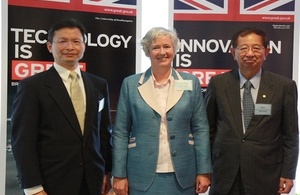UK - Taiwan explore future collaboration on science & innovation
The British Office Taipei organised a UK-Taiwan Science & Innovation Seminar on 4 May 2017.

Science and Innovation Seminar
The British Office Taipei, supported by the UK Science & Innovation Network, organised a UK-Taiwan Science & Innovation Seminar on 4 May 2017. At the seminar the British Office presented its science & innovation priorities in Taiwan and the activities it will organize to strengthen UK-TW collaboration in the coming year. Taiwanese Nobel Laureate Prof. Lee Yuan Tseh gave the keynote speech on the importance of international scientific collaboration, and UK and Taiwanese researchers discussed opportunities for stronger UK-Taiwan collaboration in a number of sectors.
In her opening remarks, Representative Catherine Nettleton explained that “the UK and Taiwan are natural partners because they both place science and innovation at the heart of their growth strategies”. Representative Nettleton said that there are many ways in which we can work more closely together to tackle shared scientific questions and to create commercial benefits. The British Office has identified five science & innovation priority sectors, which closely align with Taiwan’s ‘5+2 innovative industries’, namely: ‘health and life sciences’, ‘future manufacturing’, ‘clean energy’, ‘digital economy’ and ‘space’.
In these sectors, the British Office will organize various exchanges and workshops between British and Taiwanese researchers and companies. In the coming months this includes supporting the National Energy Programme II to attend the All Energy Conference in Glasgow (8-12 May), a NARLabs/NSPO delegation to meet leading space institutions in the UK (29 May-2 June), and a Taiwanese industry delegation to attend ‘UK Robotics Week’ in London (24-30 June). In the latter half of the year we plan to bring delegations from the UK to Taiwan, including on robotics, medtech, web and data science, and space.
Prof. Lee Yuan Tseh, who won the Nobel Prize for Chemistry in 1986, gave the keynote speech titled ‘Strengthening international science for the benefit of society’. He encouraged British and Taiwanese researchers to join forces to create a safer and more prosperous society. Prof. Lee has a long track record in promoting international science collaboration, including as the former President of the International Council for Science. He is also an Honorary Fellow at the UK Royal Society of Chemistry, the world’s leading chemistry community aimed at advancing excellence in the chemical sciences.
The panel discussions on ‘science collaboration’ and ‘industrial innovation collaboration’ brought together Taiwanese and British partners that have been engaged in bilateral collaboration projects, such as on geothermal energy and satellite technology, to discuss how they have benefitted from working together and how they might strengthen their collaboration in the future. They praised the UK’s strong fundamental science base and Taiwan’s excellent track record in commercialisation of scientific results, and emphasized the importance of continued collaboration.
The audience consisted of ca. 40 people representing the British Office’s main partners in this field, such as Academia Sinica, the Ministry of Science and Technology, National Applied Research Laboratories, the Industrial Technology Research Institute, the Institute for Information Industry and numerous leading universities. ### British Office Taipei Science & Innovation priority sectors and activities in 2017/18
-
On ‘future manufacturing’, British and Taiwanese researchers are already working together on social care robots, robotic hands, and medical robotics. The British Office will organize a mission to ‘UK Robotics Week’ 24-30 June for Taiwanese researchers and industry leaders, and will bring a delegation from the UK to the industry-leading precision machinery cluster in Taichung in November. The aim is to build strong links between UK and Taiwanese robotics researchers and companies, so they can engage in joint R&D and commercial projects.
-
On ‘health and life sciences’, the British Office sees great potential to work more with Taiwan on medical devices and medical technology, given Taiwan’s excellent track record in hardware development and the UK’s world-class medical technology and healthcare system. The British Office organized a successful medtech mission to Taiwan together with ITRI in March, and plans to do the same early next year.
-
On ‘clean energy’, the UK is a world leader on clean energy technologies such as off shore wind parks, smart grids and carbon management. As Taiwan transitions to a greener energy mix, there is a lot of scope for collaboration in this field. The British Office therefore supports Taiwanese delegations going to the UK, including the delegation led by the National Energy Programme II to the All Energy conference in Glasgow on 10-11 May.
-
On ‘space’, the UK and Taiwan both have advanced satellite programmes, with a shared focus on earth observation and meteorological/climate monitoring. The UK’s Surrey Satellite Technologies Ltd. and Taiwan’s National Space Organisation (NSPO) already collaborate on satellite technology, and the British Office supports a NARLabs/NSPO delegation to meet leading space institutions in the UK 29 May to 2 June.
-
On ‘digital economy & ICT’, the UK and Taiwan have a number of joint R&D projects on 5G and Internet of Things, such as between ITRI and the University of Surrey’s 5G Innovation Centre. The British Office is organizing a mission to Taiwan later this year by Prof. Dame Wendy Hall, one of the UK’s most influential women in IT and leader of the UK government’s review on Artificial Intelligence, to explore cooperation with Taiwan on web science and data science.